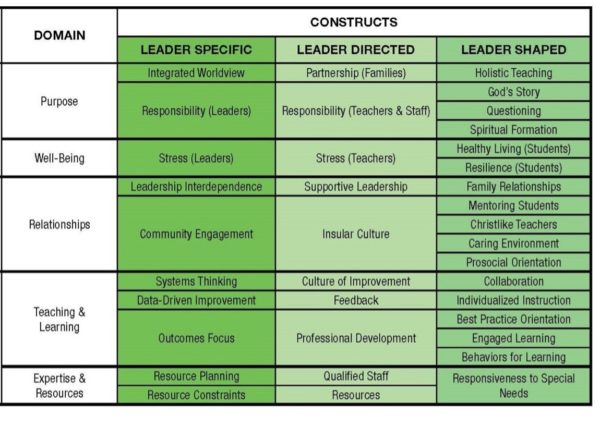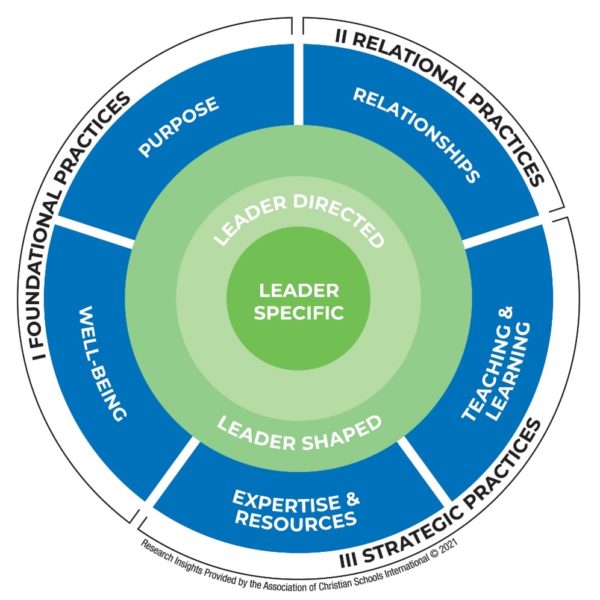Because of their biblically-based philosophy of education, Christian schools ground their vision and mission in Scripture. Based on the scriptural truth that God desires to bless his people and cause them to flourish (Psalm 44:2; 52:8; 72:7, 16; 92:12-13), ACSI Research set out in 2018-2019 to understand the ways in which Christian schools can flourish.
Over 15,000 Christian school students, teachers, administrators, board members, parents, support staff, and alumni participated in the Flourishing Schools Research initiative. The results of this research were groundbreaking and yielded the first-ever measure and model of Christian school flourishing, which clusters 35 validated constructs for all survey groups into five domains of flourishing: Purpose; Relationships; Teaching & Learning; Expertise & Resources; and Well-Being. These domains provide a compelling and comprehensive picture of the areas in which Christian schools can focus their efforts and resources in order to promote a flourishing school culture and community. The model has been externally reviewed and rigorously validated to provide leaders with statistically sound and relevant feedback for their schools.
The question remains, however, how these findings can best be utilized by school leaders—including heads of school, administrators, and school boards—to develop their own practices that lead to flourishing-related outcomes for their schools. A new report from ACSI, Leadership for Flourishing Schools: From Research to Practice, answers this question with a review of data-driven insights from the Flourishing Schools Research. [Note: while this article provides an overview, readers are encouraged to download the full report here].
Leadership Matters
When it comes to outcomes for students, teachers, and schools, leadership matters. Leaders know this intuitively, but importantly, this fact has been demonstrated through previous research. The FSCI engages a range of leaders, including heads of school, principals and other administrators, board members, and teacher leaders. This makes factor analysis of constructs for leaders not only possible but also successful in yielding three “categories” of constructs as they relate to leaders (see table below). These are:
- Leader specific constructs, which are “embodied” by leaders and developed in an iterative cycle for professional and leadership development (i.e. reflect and assess performance, identify areas for improvement, create a plan to resource and support improvement, and evaluate change in performance);
- Leader directed constructs for which leaders are directly responsible, and require working collaboratively with school constituents, creating 360-degree feedback mechanisms, using data to improve decisions, and developing policies and procedures that support flourishing; and
- Leader shaped constructs, which leaders influence at the level of culture through change management, setting mission-aligned expectations, modeling, community engagement, and evaluation of culture-level change.
FSCM Construct Categories for Leaders*

*For descriptions of constructs, consult the full report here.
Leadership Practices for Flourishing
The present report builds upon these three data-informed levels of leadership to identify leadership practices that promote flourishing (see figure below):
- First, as the name suggests, foundational practices are those which are prerequisites for leading flourishing schools. In the FSCM, foundational practices arise from the Purpose and Well-Being domains. These practices reflect the widely known leadership tenet that leaders must “lead themselves first” as well as “lead by example” in modeling spiritual devotion and self-development for their teachers and students.
- Second, through relational practices (derived from constructs in the Relationships domain), leaders promote healthy relationships not only with and among teachers, staff, and students, but also with the local community at large. Education is fundamentally a relational enterprise, but Christian education is all the more so given the incarnational nature of the Christian faith (John 1:14) and the emphasis of Scripture on love of neighbor (Mark 12:30-31).
- And finally, through strategic practices (related to the Teaching & Learning and Expertise & Resources domains), leaders become be good stewards of people and resources and pursue sound financial planning and hiring to create an environment in which educators and students can thrive. From formal education and training to on-the-job learning to networked improvement communities, school leaders build their strategic practices by learning from one another, sharing resources, and seeking mentorship in these critical areas of flourishing school leadership.
In addition to exploring these practices, the report provides two sets of self-reflection guides—one for school leaders and one for school boards—with questions that can be used individually and collaboratively to strengthen leaders’ foundational, relational, and strategic practices.

Using the FSCI to Lead Schools
Finally, with over one hundred schools administering the FSCI since its launch, the size of the research database and the opportunity to collect qualitative data on how schools use FSCI results continues to grow. The concluding section of the report shares insights from this expanding knowledge base around flourishing in Christian schools.
To this end, qualitative feedback from leaders indicated that FSCI insights have helped them in gauging school priorities—specifically, by helping leaders to telescope out to the level of culture, to identify what “matters” the most for improvement, and to make mission-aligned change. For example, one school leader reported that the FSCI enabled the school to zero in on “accomplishing the things that matter the most.” Another cited the FSCI as key in examining “our own school culture” and the “strengths and weaknesses” in that culture. And a third indicated that the FSCI insights enhanced the school’s ability to “implement change… for delivering our mission to school families with the highest excellence.”
Specific ways in which FSCI results are being used by school leaders fall into four categories, as follows:
- Communicating strengths—internally and externally. Data from the FSCI on school strengths can be used as part of internal and external communication efforts—both of which play important roles in shaping school culture—whether through school correspondence, on social media, or at school events.
- Capitalizing on strengths to build momentum. Schools can engage relevant internal stakeholders (board, leaders, staff) in discussions around how areas of strength can be reinforced and built out. Understanding how a school has developed a particular area of strength can also help the school to leverage those strengths to improve other areas, which can create a snowball or cascade effect, whereby the momentum for change is generated by engaging the core strengths of the school.
- Using insights in existing efforts. The growth opportunities identified by the FSCI can help inform ongoing efforts to shape and strengthen school, such as strategic planning, school improvement planning, and accreditation efforts. For many schools, FSCI insights have helped to spark dialogue and collaboration across multiple school audiences and provided needed external validation of change efforts already underway at the school.
- Developing new/targeted efforts. Schools have also reported developing new programs or initiatives to address key growth opportunities identified by the FSCI; for example, school leaders reported that findings in the Well-Being domain “alerted” them to the need for planning and programming around stress reduction for teachers. The FSCI school level report recommends that school leaders research best practices in areas for growth as well as visit other schools with demonstrated success in those areas.
Christian schools have Jesus as their model who did “everything well” and brought hope and healing to all who were in need (Mark 7:37). Flourishing schools engage in continual growth and improvement so they can minister Christ’s love (Ephesians 5:2) and light (Matthew 5:14-16) more fully to the larger communities in which they are situated. For this reason, school leaders seek to grow in all the domains of flourishing—in their expression of and living out their purpose, in the quality of their relationships, in how they support teaching and learning, in their stewardship of expertise and resources, and in their care for the well-being of themselves and others—and to lead their schools and colleagues in the same abundant, life-giving journey toward flourishing (John 10:10b).
About the Authors
 Dr. Lynn Swaner is the Chief Strategy and Innovation Officer at ACSI, where she leads initiatives and develops strategies to address compelling questions and challenges facing Christian education. Prior to joining ACSI she served as a Christian school administrator and a graduate professor of education. Dr. Swaner serves as a Cardus Senior Fellow, editor of the ACSI blog, and co-author or editor of multiple books on Christian education, including Flourishing Together: A Christian Vision for Students, Educators, and Schools (forthcoming 2021), MindShift: Catalyzing Change in Christian Education, PIVOT: New Directions for Christian Education, and Bring It to Life: Christian Education and the Transformative Power of Service-Learning. She can be reached via email at lynn_swaner@acsi.org and followed on Twitter @LynnSwaner1.
Dr. Lynn Swaner is the Chief Strategy and Innovation Officer at ACSI, where she leads initiatives and develops strategies to address compelling questions and challenges facing Christian education. Prior to joining ACSI she served as a Christian school administrator and a graduate professor of education. Dr. Swaner serves as a Cardus Senior Fellow, editor of the ACSI blog, and co-author or editor of multiple books on Christian education, including Flourishing Together: A Christian Vision for Students, Educators, and Schools (forthcoming 2021), MindShift: Catalyzing Change in Christian Education, PIVOT: New Directions for Christian Education, and Bring It to Life: Christian Education and the Transformative Power of Service-Learning. She can be reached via email at lynn_swaner@acsi.org and followed on Twitter @LynnSwaner1.
 Cindy Dodds has been in Christian school leadership for over 20 years. During that time, Cindy led two formative-level schools from a deficit budget to a place of financial solvency and stability. Her expertise provides common-sense, practical solutions, and hope for school leaders. Cindy currently serves with ACSI as the Director of Professional Development. She can be reached via email at cindy_dodds@acsi.org.
Cindy Dodds has been in Christian school leadership for over 20 years. During that time, Cindy led two formative-level schools from a deficit budget to a place of financial solvency and stability. Her expertise provides common-sense, practical solutions, and hope for school leaders. Cindy currently serves with ACSI as the Director of Professional Development. She can be reached via email at cindy_dodds@acsi.org.
 Matthew Lee is a graduate student in education policy at the University of Arkansas. He is co-editor of the book Religious Liberty and Education: A Case Study of Yeshivas vs. New York. He can be reached via email at matthew_lee@acsi.org and followed on Twitter @hmatthewlee.
Matthew Lee is a graduate student in education policy at the University of Arkansas. He is co-editor of the book Religious Liberty and Education: A Case Study of Yeshivas vs. New York. He can be reached via email at matthew_lee@acsi.org and followed on Twitter @hmatthewlee.

